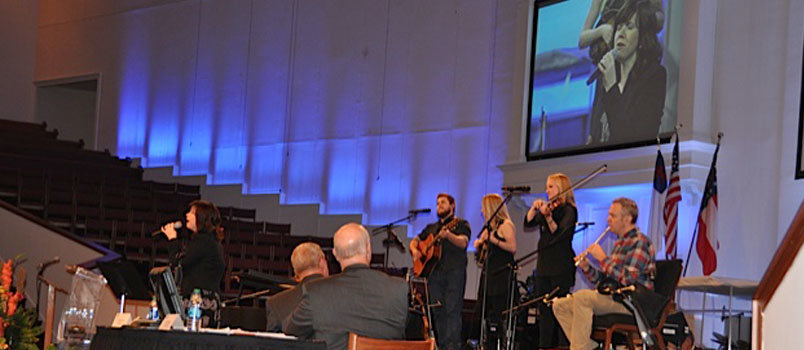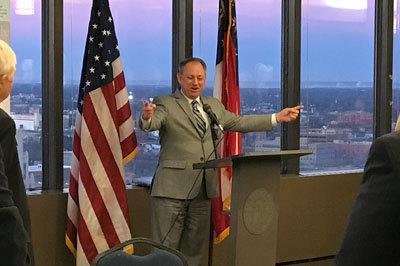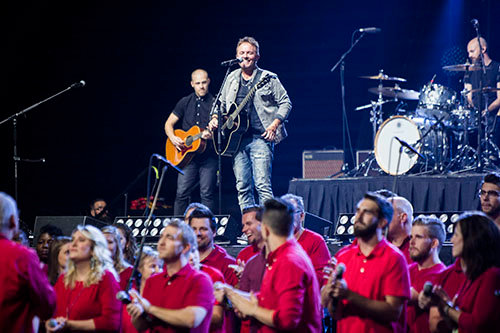 Recording artist Kristyn Getty, far left, leads in special music along with her husband, Keith (not shown) at the opening session of the 2015 Georgia Baptist Convention session. The couple are known for their contemporary style which includes a foundation in hymn writing. JOE WESTBURY/Index
Recording artist Kristyn Getty, far left, leads in special music along with her husband, Keith (not shown) at the opening session of the 2015 Georgia Baptist Convention session. The couple are known for their contemporary style which includes a foundation in hymn writing. JOE WESTBURY/IndexEven a quick Google search for “Theology of Music” will produce thousands of books and articles about the topic, some very recent. But narrowing the same scope of query to auditory learning styles reveals that little has been explored in this area.
Jon Duncan, lead state missionary with the Georgia Baptist Mission Board, is well known throughout the state for music development, camps, and missions endeavors. But, at heart he is also a theologian. For the last 15 years, his “Discovering Biblical Worship” Conferences have been popular in Georgia Baptist churches and associations.
In a recent podcast of “Kingdom Generosity Moments,” Buck Burch and Jon Duncan explore this subject from the angle of helping church leaders facilitate discipleship.
 State missionary Jon Duncan has served Georgia Baptists through worship and music ministry since 2002. JOE WESTBURY/Index
State missionary Jon Duncan has served Georgia Baptists through worship and music ministry since 2002. JOE WESTBURY/IndexDuncan, an Oklahoma native who has served as a missionary in Georgia since 2002, believes generosity is an attitude of the heart resulting from a new life in Christ. He believes generosity defines who we are as Baptists – “We are people that give,” he says. “It is an expression of the Spirit-filled life that goes beyond the amount of the money… it is a joyous attitude.” As a beautiful consequence of salvation, Duncan humbly adds, “I now have a privilege of giving.”
But is generosity something learned or innate? Duncan thinks it is both, but he ties generosity to being a changed person in Christ. He smiles when he says, “We were once dead, now made alive.” Expounding further, “We were shackled but now liberated … there is now a joy in giving things away.”
Different people learn in different ways. Musical/auditory is one learning style that some people in the pews prefer. Duncan believes every Christian has this musical preference to some degree, because each person reflects the image of God and because God’s own nature is to “sing over His people with His love” (Zeph 3:17). But even recent scientific research has revealed that music engages both hemispheres of the brain, thus suggesting a broader range of learning preference for this style.
 Historically music in the church – as reflected in hymns – has focused on theology while contemporary music stresses more on feelings and emotions.[/caption]
Historically music in the church – as reflected in hymns – has focused on theology while contemporary music stresses more on feelings and emotions.[/caption] Historically, the church has used music as a medium for theological truth. Luther employed it for an illiterate society through his hymnody, using common tunes to teach the truths of Scripture. Duncan believes Luther’s method is still important in “developing a doctrinal statement of faith among people.” Wesley and Watts also used music to convey truth.
Biblically, Paul referred often with strong admonitions to “sing psalms, hymns, and spiritual songs” and to “make melody in your hearts” (Eph 5:19; Col 3:16). It was a primary way Paul encouraged the communication of biblical truth among Gentiles who had limited knowledge of the Old Testament. “Truth was amplified deeply and quickly through music,” Duncan explains.
Duncan laments this noticeable shift toward the ego and away from the character of God. “It’s one thing to sing songs that lead us to deeper devotional life … but there was an intentionality among the hymnwriters of the 17th, 18th, or 19th centuries. They wrote hymns that included giving, our missional responsibility, and included the Second Coming of the Lord.”
 Chris Tomlin's style of contemporary music reflects more of the nature of hymns than many give him credit for. HARVEST CRUSADES/Special
Chris Tomlin's style of contemporary music reflects more of the nature of hymns than many give him credit for. HARVEST CRUSADES/SpecialHe adds that those songs were not “recreational in nature but confrontational for the believer who took a lackadaisical approach to their walk with Christ.” Duncan is very adamant that he is not exalting a particular worship style or song genre over another. However, he purposefully states that “we’ve not emphasized through music those difficult but important tenets of the faith.” Instead, he believes we have become musically anemic with a me-centered approach to praise and worship.
Duncan’s theology of music refreshingly reiterates our need for intentionality in singing about God’s generosity. “If not checked, this can reduce our theology to a more anthropocentric viewpoint, where my religiosity depends more on how I feel than on the relationship I have with the One who has redeemed me.” Duncan questions the “soul adrenaline” we have allowed to trump content in our worship, and he calls out our allowing experience to have primacy over our obedience. Our music should reflect a call to obedience from singing about God’s nature and work.
Senior pastors, church leaders, Sunday School teachers and (of course) music and worship pastors have been sent a link to listen to the Kingdom Generosity podcast. It can be accessed freely at www.tinyurl.com/kgmoment.